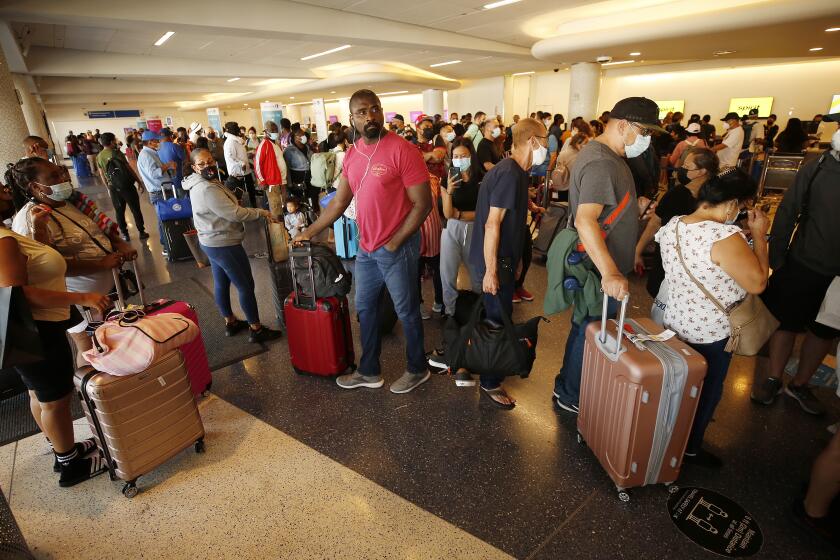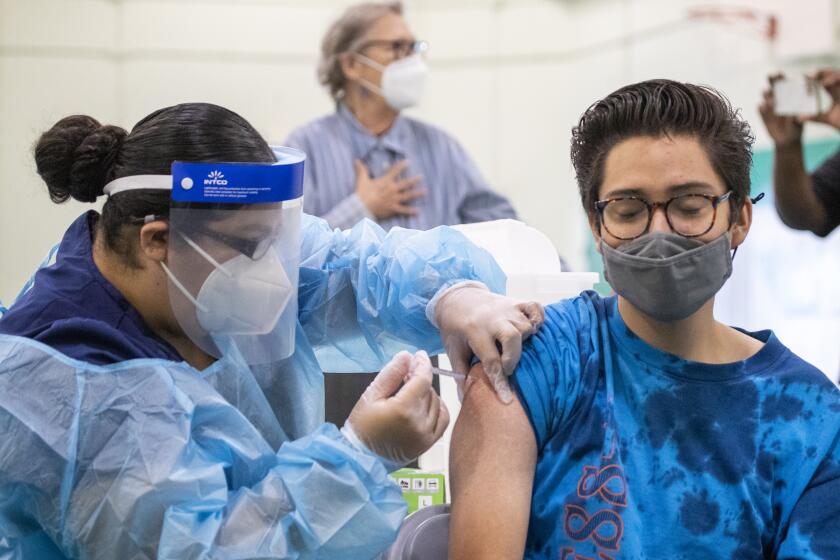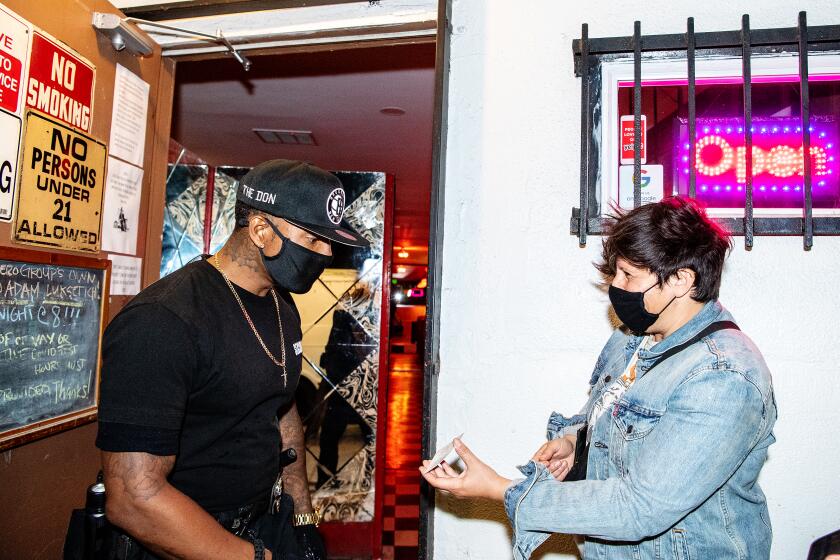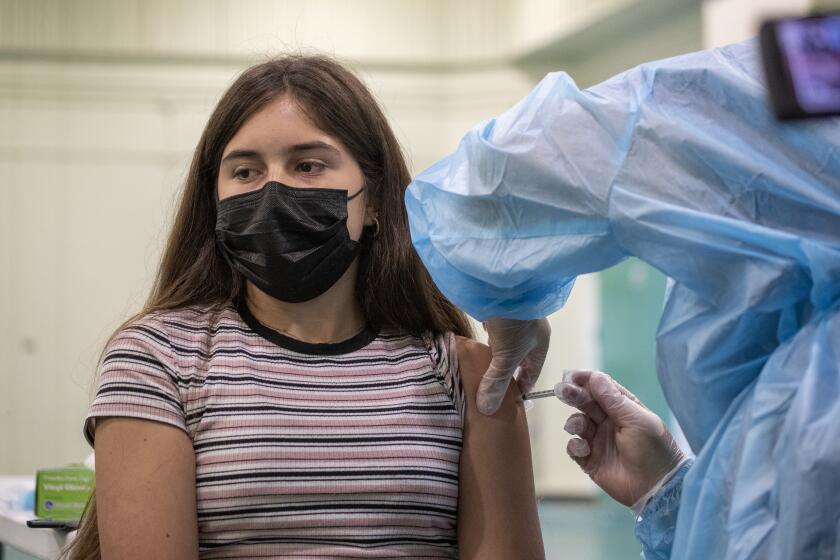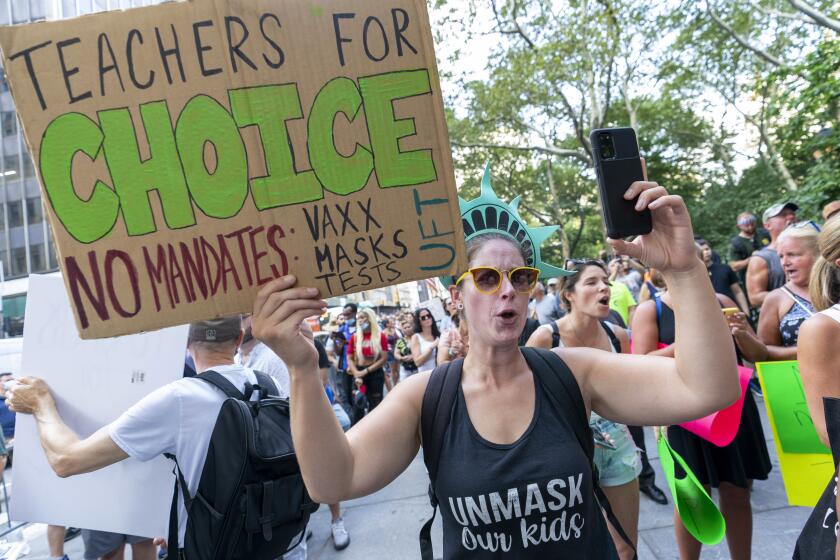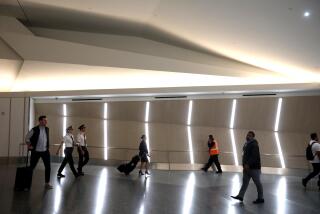Coronavirus can spread among vaccinated people, so officials urge cautious Labor Day
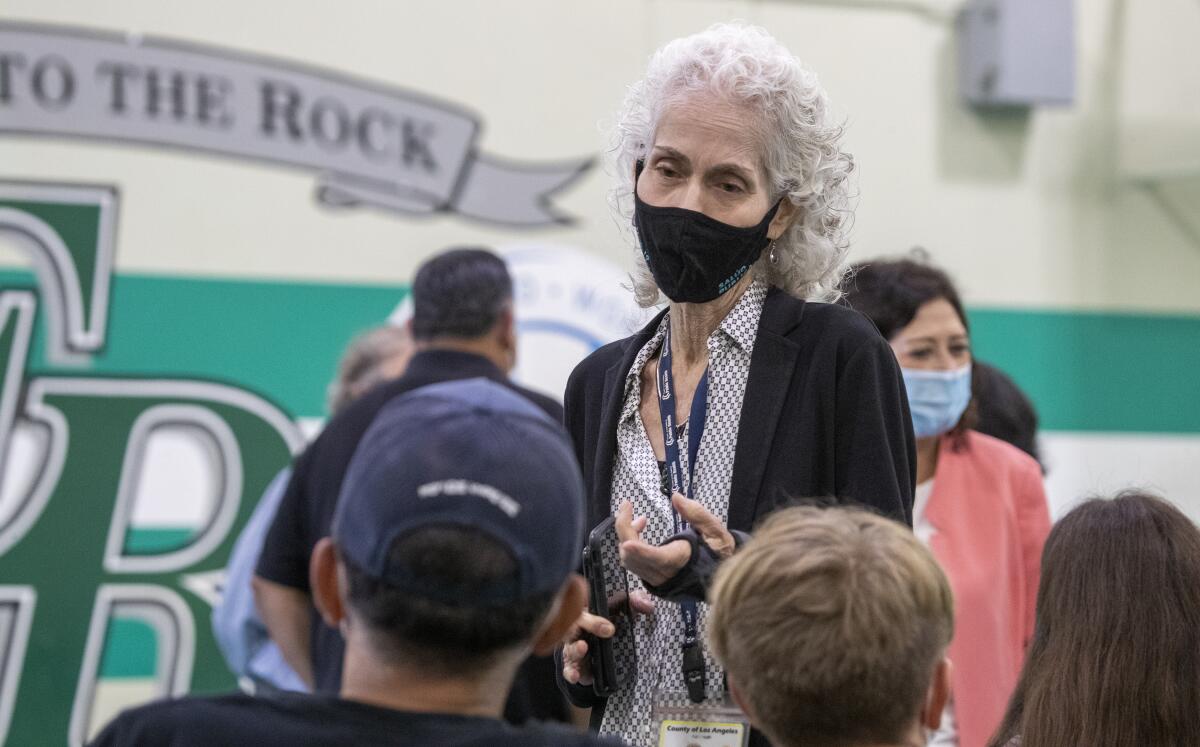
The Delta variant has dramatically changed what we once thought was true about the coronavirus.
While vaccinated people continue to enjoy much greater protection from infection or serious COVID-19 illness than the unvaccinated, it’s now clear that even those who have gotten their shots can still contract and spread the virus.
“One thing is for sure: Vaccinated people can get infected, and they can transmit to other vaccinated people,” Los Angeles County Public Health Director Barbara Ferrer said Thursday. “Vax-on-vax transmission has happened.”
Health officials stress the risk of that happening is much lower than transmission among the unvaccinated, and that the vaccines are effective at staving off the worst health impacts of COVID-19.
Nevertheless, the ubiquity of Delta throughout California and the country should be cause for some caution, particularly heading into Labor Day weekend, officials say.
The robust vaccine rollout, as well as ubiquity of the highly contagious Delta variant, has created a wide spectrum of risk — with people’s inoculation status, home lives and job settings all helping shape how cautious they should be.
Vaccinated people
Given the current pandemic landscape, vaccinated adults and teens who live with young children too young to be vaccinated will need to evaluate their relative risks.
When weighing whether to attend a gathering or patronize an indoor business, a fully vaccinated parent or grandparent who lives with young children would have a number of things to consider, Ferrer said during a briefing.
While fully vaccinated people “are very unlikely to get seriously ill ... you want to you want to consider your own activities in light of who else you’re living with or interacting with.”
By contrast, vaccinated adults in their 50s, who have no small children at home, are in relatively good health and spend time with vaccinated people may feel more comfortable with the added risk of eating at a restaurant or a movie theater, Ferrer said.
In a sign that school-based COVID-19 safety measures are showing promise, fewer students and staff were exposed to the coronavirus in these outbreaks.
Key questions
Some important considerations include:
• Are there a lot of people there and is it crowded? The more people there are in a setting, the more likely some there could be infected with the Delta variant.
• If indoors, are there windows open? Is there good ventilation? Can the event be held outdoors, which is much safer?
• Are people unmasked for long periods of time? Are people spending hours eating and drinking, maskless? There’s less risk if people quickly mask up once they’ve finished eating and drinking.
• Is the group small? If you know everyone there is vaccinated, there’s less risk.
Around L.A., some businesses are asking for proof of vaccination against COVID-19 to enter. Here’s what you need to know about vaccination records.
Riskier settings
Riskier settings include those that are crowded, indoors, include groups of unmasked or unvaccinated people or feature individuals shouting, singing or breathing hard.
The presence of unvaccinated people poses a much larger risk. Scientists suspect that unvaccinated infected people are contagious for a far longer duration than vaccinated infected people.
“There’s so much transmission, and we keep showing those numbers about how much more risk there is for people who are unvaccinated to get infected, and then get very ill,” Ferrer added. “So unvaccinated people should really do as much as possible outdoors and avoid crowded situations as much as possible. It’s just not safe when we have a lot of community transmission.”
Compared with some other large states, California is seeing some positive signs in fighting the latest coronavirus surge fueled by the Delta variant.
Travel
California health officials recommend residents delay both domestic and international travel until they’re fully vaccinated. Those who are uninoculated should also get tested before and after their journeys.
All Californians, regardless of vaccination status, also must wear masks while aboard public transportation — including airplanes — or while in transit hubs.
Unvaccinated plane travelers risk exposure to the coronavirus at multiple points on their journey, officials say.
“When you get to the airport, you’re going to be exposed to a lot of people, and then you’re going to get on an airplane,” said Dr. Regina Chinsio-Kwong, a deputy health officer for Orange County. “Even if you’re wearing your mask, you’re going to be in an enclosed area for a prolonged period. Your immune system takes a hit because you’re not sleeping well. I mean, there’s just so many other factors that make things ripe for you to — if you would get exposed — to unfortunately become ill with COVID.”
No major religions denounce vaccination. That hasn’t kept individual churches from providing religious “cover” for those seeking to avoid jabs.
Breakthroughs
Statewide, 112,460 post-vaccination coronavirus cases have been identified out of the more than 22.5 million people who have been inoculated.
Unvaccinated people are still being infected at notably higher rates than their vaccinated counterparts, according to the California Department of Public Health. Over the week of Aug. 15 to 21, the average case rate among Californians age 16 and up who are unvaccinated was 61.55 per 100,000 people per day — nearly six times higher than the comparable rate for vaccinated residents of that age.
Though the hyper-transmissibility of the Delta variant has led to an increase in “breakthrough” cases, data continue to show that fully vaccinated people are well protected from serious COVID-19 illness.
As of Tuesday, roughly 5.28 million people had been fully vaccinated in L.A. County. Of those, 37,614, or 0.71%, later tested positive; 1,049, or 0.02%, were hospitalized at some point; and 118, or 0.0022%, ultimately died.
“When community transmission is high, more fully vaccinated people are likely to get infected,” Ferrer said. “But these numbers also show us that, while vaccines are imperfect, people who are fully vaccinated are extremely well protected from COVID-related hospitalizations and deaths.”
More to Read
Sign up for Essential California
The most important California stories and recommendations in your inbox every morning.
You may occasionally receive promotional content from the Los Angeles Times.
